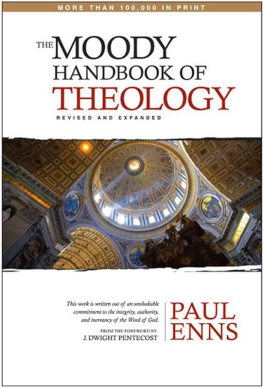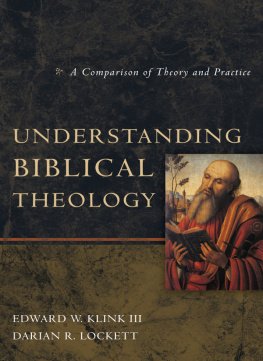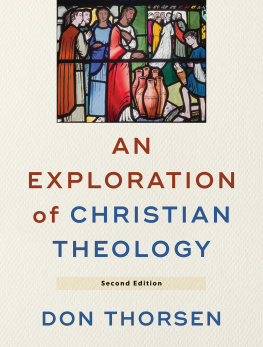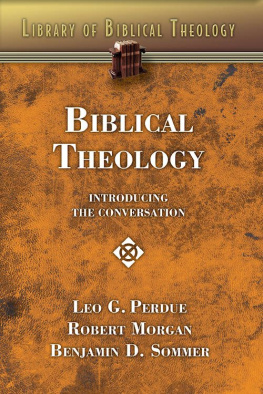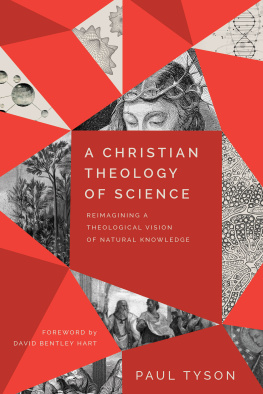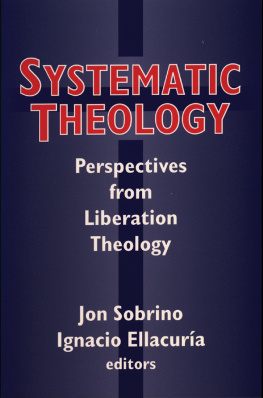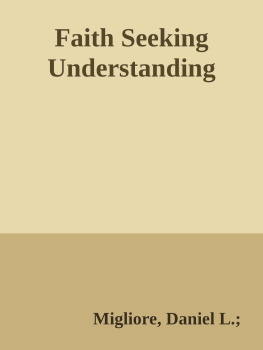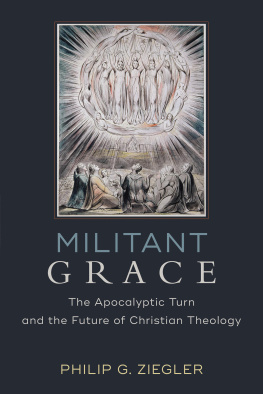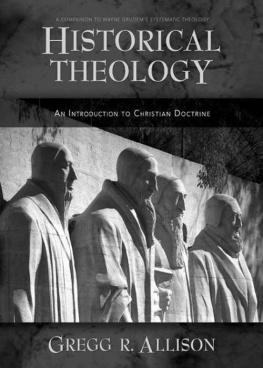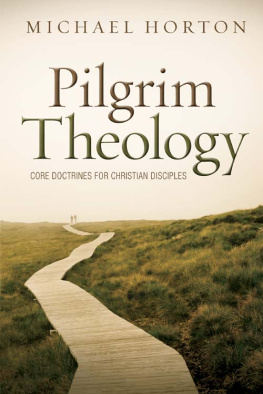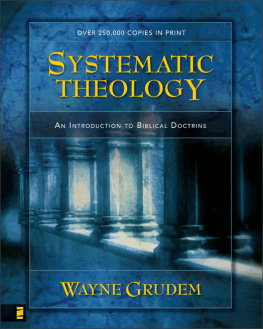THE MOODY
HANDBOOK OF
THEOLOGY REVISED AND EXPANDED
PAUL ENNS
MOODY PUBLISHERS
Chicago
1989, 2008 by
P AUL E NNS
All rights reserved. No part of this book may be reproduced in any form without permission in writing from the publisher, except in the case of brief quotations embodied in critical articles or reviews.
All Scripture quotations, unless otherwise indicated, are taken from the New American Standard Bible , Copyright 1960, 1962, 1963, 1968, 1971, 1972, 1973, 1975, 1977, 1995 by The Lockman Foundation. Used by permission. (www.Lockman.org)
Editors: Jim Vincent, Allan Sholes
Cover Design: Paetzold. Design
Cover Image: GettyImage
Interior Design: Ragont Design
Library of Congress Cataloging-in-Publication Data
Enns, Paul I.
The moody handbook of theology / by Paul Enns.Rev. and expanded.
p. cm.
Includes bibliographical references and index.
ISBN-13: 978-0-8024-3434-0
ISBN-10: 0-8024-3434-7
1. TheologyHandbooks, manuals, etc. 2. FundamentalismHandbooks, manuals, etc. 3. DispensationalismHandbooks, manuals, etc. 4. EvangelicalismHandbooks, manuals, etc. I. Title.
BR118.E67 2008
230.04624dc22
2007045189
We hope you enjoy this book from Moody Publishers. Our goal is to provide high-quality, thought-provoking books and products that connect truth to your real needs and challenges. For more information on other books and products written and produced from a biblical perspective, go to www.moodypublishers.com or write to:
Moody Publishers
820 N. LaSalle Boulevard
Chicago, IL 60610
1 3 5 7 9 1 0 8 6 4 2
Printed in the United States of America
This book is dedicated to my beloved wife, Helen, with whom I enjoyed forty-five honeymoon years, a selfless wife and mother, with whom the Lord united me in heart and soul. She put Christ and her family first, led both of our sons to faith in Christ, and ministered to me in a profound way. I never got over the thrill of being married to Helen. I eagerly look forward to our reunion in heaven.
And to Terry and Jeremy, my sons, who are walking with the Lord, serving Him, and raising their children in the nurture and admonition of the Lord. My wife and sons have been the members of Kitchen Table Theology 101, with whom I have shared many of these doctrines .



THERE IS NO HIGHER ACTIVITY in which the mind may be engaged than the pursuit of a knowledge of God. Since man through the exercise of his mind alone can never come to a knowledge of God (1 Cor. 1:1920; 2:14) he is dependent upon the revelation of Himself which God has given to him (1 Cor. 2:910). Since God has revealed Himself through creation (Rom. 1:1920), some seek Him through a study of the natural sciences, only to find that what can be learned through this area is limited and incomplete. God has revealed Himself at various times and in various ways (Heb. 1:1) and has caused that revelation to be accurately recorded by inspiration of the Holy Spirit in an inerrant Scripture. If mortals really want to know God, they must give themselves to a study of the written Word of God.People may pursue this knowledge by different approaches to the Bible. Some will develop a biblical theology, in which the theologian will synthesize the teachings of the Bible, deriving these truths, stage by stage, within the time boundaries of particular biblical eras or authors lifetimes. Others will develop a systematic theology, in which Bible doctrines may be considered comprehensively and organized in a philosophical or logical format. Others will study doctrines according to their historical development throughout time from the close of the canon of Scripture until the present day. This study considers both the erroneous interpretations that were rejected by the church as well as the true conclusions approved by it. One may be safeguarded from error by considering the history of the interpretation of any doctrine, rejecting the false and accepting the true. Others may concentrate on contemporary theology. This study is important in order to present the truth of the Bible in the context of current ideologies. Still others may pursue the study of Scripture by comparing various systems of theology that have arisen through the course of church history. There is certainly merit and benefit in all these approaches. Volumes on any one of these methods have been written and are readily available for in-depth consultation.In this present work Dr. Paul Enns brings together in one volume a compendium including all these theological methods. Whatever the interest of the student, he will find pertinent material at hand without having to go from volume to volume or from author to author to bring this material together. The author begins with a treatment of biblical theology and follows this with sequential studies of systematic theology, historical theology, dogmatic theology, and contemporary theology. Thus, within a common analysis, these various approaches to the knowledge of God in the Word are assembled, explained, and demonstrated in this Moody Handbook of Theology .This work is written out of an unshakable commitment to the integrity, authority, and inerrancy of the Word of God. It is written from an evangelical viewpoint, although many divergent interpretations and systems are presented and evaluated in the light of the Word of God. The author seeks to fulfill the injunction of Titus 2:1, Speak the things which are fitting for sound doctrine.This work may be used by any serious student who desires to understand Gods revelation, whether it is considered biblically, systematically, or historically. As a result the attentive reader will be able to fit biblical truth into current theological thinking or into various systems that have arisen to organize Gods truth.May the God who has revealed Himself be pleased to use this work to lead many into a knowledge of Himself.J. Dwight Pentecost
Distinguished Professor Emeritus
Dallas Theological Seminary, Dallas, Texas

SINCE THE INITIAL PUBLICATION of The Moody Handbook of Theology in 1989, a number of theological issues have arisen that need to be addressedand questions that need to be asked.Consider the charismatic movement. Of course, it existed prior to the first edition of this book, but it has continued to gain momentum and has also expressed itself in prosperity theology, a position that not all charismatics accept. Does God want His people to be healthy and wealthy?Openness theology is posing a different view of God. Does God know all aspects of the future? Does He know the decisions we will make before we make them? How does that affect our freedom? These are the considerations of openness theology.Developing rapidly on the cultural scene is the emerging (or emergent) church. There is considerable latitude in the theological positions that differing emergent leaders hold, but their focus is similar: They wish to reach and influence our postmodern culture. Are there dangers involved in the movement? What are the theological positions of their leaders? What are the methodology and focus?Other issues continue to surface. The feminist issue is growing increasingly vocal. What does the Bible teach about the role of women in the home and in the church?Dominion theology seeks to promote Christian domination in the public arena. What are the biblical parameters? Replacement theology reflects an aspect of covenant theology that maintains the church has replaced Israel. Does Israel have a future in Gods program? That question, in fact, reflects on dispensationalism. A relatively recent development within dispensationalism has been progressive dispensationalism, which also raises the question: what are the distinctions between Israel and the church? When does Christs rule beginis He ruling now, as amillennialists state, or is His rule restricted to the future, as classic dispensationalists hold? Or is He ruling, in some sense, now and not yet, as some progressive dispensationalists maintain?I have made additions to chapters on other subjects as well and expanded the bibliographic listings, which I trust will be of help to the reader.Lets keep one thing in perspective: While new emphases surface in theology, true doctrine does not change. Perhaps we need a strong reminder of Gods sovereignty, majesty, and holiness while we live in this sinful world. Much of our culture seems to devalue Gods sovereignty and majesty and to elevate humanity and freedom. Yet, as most conservative biblicists would agree, the Lord will consummate this age according to His sovereign plan with the triumphant return of Jesus Christ and the establishment of His kingdom (Matt. 25:31).In the publication of this new edition of The Moody Handbook of Theology I wish to thank Greg Thornton, vice president and publisher, Moody Publishers, for his constant encouragement and his vision. It is a blessing to work together with him. Thanks also to Allan Sholes, who worked with me in editing the expansion and update. It has been a pleasure to work with him.I have been writing this material with a heavy heart. My beloved wife, Helen, with whom I enjoyed forty-five honeymoon years, went home to heaven suddenly on January 31, 2005. We were truly one, and life is difficult without her. Yet Helens departure has caused me to focus on heaven, and that focus is depicted in the additional material on heaven. My sincere thanks for the encouragement I have received from Dr. Erwin Lutzer, both in person and through his wonderful book One Minute after You Die . Thanks also to Randy Alcorn for his supreme contribution to the subject in his book Heaven . The church family at Idlewild Baptist Church, with senior pastor, Dr. Ken Whitten, has been loving and comforting to me during this timeeverything a church was meant to be.During this difficult time I also wish to thank my son and daughter-in-law, Jeremy and Kim, and their children, who live nearby and have been a great encouragement and comfort to me. To my son Terry and his family in Texas, I also thank them for their support.Perhaps the constantly changing scene on theological issues is a reminder that a better day is coming and that we should live anticipating that glorious day when Christ returns in triumph to establish His glorious, eternal kingdom. Maranatha! O Lord, come!Colossians 3:14
 Next page
Next page
